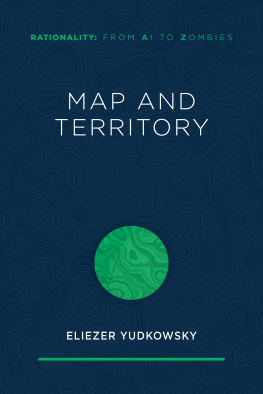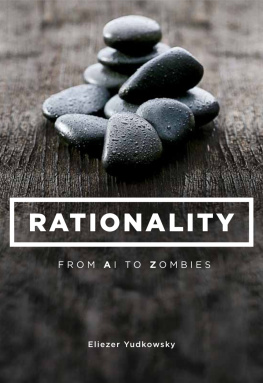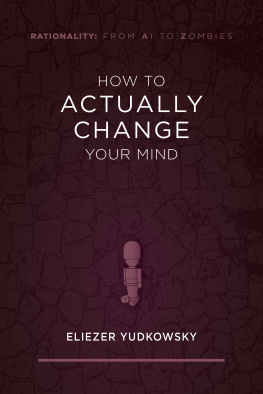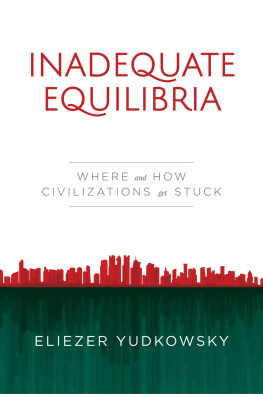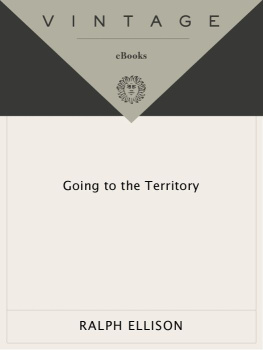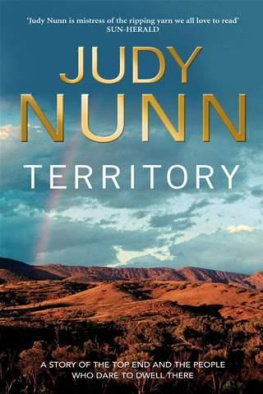Eliezer Yudkowsky - Map and Territory
Here you can read online Eliezer Yudkowsky - Map and Territory full text of the book (entire story) in english for free. Download pdf and epub, get meaning, cover and reviews about this ebook. publisher: Machine Intelligence Research Institute, genre: Religion. Description of the work, (preface) as well as reviews are available. Best literature library LitArk.com created for fans of good reading and offers a wide selection of genres:
Romance novel
Science fiction
Adventure
Detective
Science
History
Home and family
Prose
Art
Politics
Computer
Non-fiction
Religion
Business
Children
Humor
Choose a favorite category and find really read worthwhile books. Enjoy immersion in the world of imagination, feel the emotions of the characters or learn something new for yourself, make an fascinating discovery.
- Book:Map and Territory
- Author:
- Publisher:Machine Intelligence Research Institute
- Genre:
- Rating:4 / 5
- Favourites:Add to favourites
- Your mark:
- 80
- 1
- 2
- 3
- 4
- 5
Map and Territory: summary, description and annotation
We offer to read an annotation, description, summary or preface (depends on what the author of the book "Map and Territory" wrote himself). If you haven't found the necessary information about the book — write in the comments, we will try to find it.
Map and Territory — read online for free the complete book (whole text) full work
Below is the text of the book, divided by pages. System saving the place of the last page read, allows you to conveniently read the book "Map and Territory" online for free, without having to search again every time where you left off. Put a bookmark, and you can go to the page where you finished reading at any time.
Font size:
Interval:
Bookmark:
Scope Insensitivity
Once upon a time, three groups of subjects were asked how much they would pay to save 2,000 / 20,000 / 200,000 migrating birds from drowning in uncovered oil ponds. The groups respectively answered $80, $78, and $88. This is scope insensitivity or scope neglect : the number of birds savedthe scope of the altruistic actionhad little effect on willingness to pay.
Similar experiments showed that Toronto residents would pay little more to clean up all polluted lakes in Ontario than polluted lakes in a particular region of Ontario, or that residents of four western US states would pay only 28% more to protect all 57 wilderness areas in those states than to protect a single area. This image, or prototype, calls forth some level of emotional arousal that is primarily responsible for willingness-to-payand the image is the same in all cases. As for scope, it gets tossed out the windowno human can visualize 2,000 birds at once, let alone 200,000. The usual finding is that exponential increases in scope create linear increases in willingness-to-payperhaps corresponding to the linear time for our eyes to glaze over the zeroes; this small amount of affect is added, not multiplied, with the prototype affect. This hypothesis is known as valuation by prototype.
An alternative hypothesis is purchase of moral satisfaction. People spend enough money to create a warm glow in themselves, a sense of having done their duty. The level of spending needed to purchase a warm glow depends on personality and financial situation, but it certainly has nothing to do with the number of birds.
We are insensitive to scope even when human lives are at stake: Increasing the alleged risk of chlorinated drinking water from 0.004 to 2.43 annual deaths per 1,000a factor of 600increased willingness-to-pay from $3.78 to $15.23.
A paper entitled
The moral: If you want to be an effective altruist, you have to think it through with the part of your brain that processes those unexciting inky zeroes on paper, not just the part that gets real worked up about that poor struggling oil-soaked bird.
William H. Desvousges et al., Measuring Nonuse Damages Using Contingent Valuation: An Experimental Evaluation of Accuracy, technical report (Research Triangle Park, NC: RTI International, 2010).
Daniel L. McFadden and Gregory K. Leonard, Issues in the Contingent Valuation of Environmental Goods: Methodologies for Data Collection and Analysis, in Contingent Valuation: A Critical Assessment, ed. Jerry A. Hausman, Contributions to Economic Analysis220 (New York: North-Holland, 1993), 165215.
Daniel Kahneman, Ilana Ritov, and David Schkade, Economic Preferences or Attitude Expressions?: An Analysis of Dollar Responses to Public Issues, Journal of Risk and Uncertainty 19, nos. 13 (1999): 203235.
Richard T. Carson and Robert Cameron Mitchell, Sequencing and Nesting in Contingent Valuation Surveys, Journal of Environmental Economics and Management 28, no. 2 (1995): 155173.
Jonathan Baron and Joshua D. Greene, Determinants of Insensitivity to Quantity in Valuation of Public Goods: Contribution, Warm Glow, Budget Constraints, Availability, and Prominence, Journal of Experimental Psychology: Applied 2, no. 2 (1996): 107125.
David Fetherstonhaugh et al., Insensitivity to the Value of Human Life: A Study of Psychophysical Numbing, Journal of Risk and Uncertainty 14, no. 3 (1997): 283300.
The Martial Art of Rationality
I often use the metaphor that rationality is the martial art of mind. You dont need huge, bulging muscles to learn martial artstheres a tendency toward more athletic people being more likely to learn martial arts, but that may be a matter of enjoyment as much as anything else. If you have a hand, with tendons and muscles in the appropriate places, then you can learn to make a fist.
Similarly, if you have a brain, with cortical and subcortical areas in the appropriate places, you might be able to learn to use it properly. If youre a fast learner, you might learn fasterbut the art of rationality isnt about that; its about training brain machinery we all have in common. And where there are systematic errors human brains tend to makelike an insensitivity to scoperationality is about fixing those mistakes, or finding work-arounds.
Alas, our minds respond less readily to our will than our hands. Our ability to control our muscles is evolutionarily ancient; our ability to reason about our own reasoning processes is a much more recent innovation. We shouldnt be surprised, then, that muscles are easier to use than brains. But it is not wise to neglect the latter training because it is more difficult. It is not by bigger muscles that the human species rose to prominence upon Earth.
If you live in an urban area, you probably dont need to walk very far to find a martial arts dojo. Why arent there dojos that teach rationality?
One reason, perhaps, is that its harder to verify skill. To rise a level in Tae Kwon Do, you might need to break a board of a certain width. If you succeed, all the onlookers can see and applaud. If you fail, your teacher can watch how you shape a fist, and check if you shape it correctly. If not, the teacher holds out a hand and makes a fist correctly, so that you can observe how to do so.
Within martial arts schools, techniques of muscle have been refined and elaborated over generations. Techniques of rationality are harder to pass on, even to the most willing student.
Very recentlyin just the last few decadesthe human species has acquired a great deal of new knowledge about human rationality. The most salient example would be the heuristics and biases program in experimental psychology. There is also the Bayesian systematization of probability theory and statistics; evolutionary psychology; social psychology. Experimental investigations of empirical human psychology; and theoretical probability theory to interpret what our experiments tell us; and evolutionary theory to explain the conclusions. These fields give us new focusing lenses through which to view the landscape of our own minds. With their aid, we may be able to see more clearly the muscles of our brains, the fingers of thought as they move. We have a shared voc abulary in which to describe problems and solutions. Humanity may finally be ready to synthesize the martial art of mind: to refine, share, systematize, and pass on techniques of personal rationality.
Such understanding as I have of rationality, I acquired in the course of wrestling with the challenge of artificial general intelligence (an endeavor which, to actually succeed, would require sufficient mastery of rationality to build a complete working rationalist out of toothpicks and rubber bands). In most ways the AI problem is enormously more demanding than the personal art of rationality, but in some ways it is actually easier. In the martial art of mind, we need to acquire the realtime procedural skill of pulling the right levers at the right time on a large, pre-existing thinking machine whose innards are not end-user-modifiable. Some of the machinery is optimized for evolutionary selection pressures that run directly counter to our declared goals in using it. Deliberately we decide that we want to seek only the truth; but our brains have hardwired support for rationalizing falsehoods. We can try to compensate for what we choose to regard as flaws of the machinery; but we cant actually rewire the neural circuitry. Nor may martial artists plate titanium over their bonesnot today, at any rate.
Font size:
Interval:
Bookmark:
Similar books «Map and Territory»
Look at similar books to Map and Territory. We have selected literature similar in name and meaning in the hope of providing readers with more options to find new, interesting, not yet read works.
Discussion, reviews of the book Map and Territory and just readers' own opinions. Leave your comments, write what you think about the work, its meaning or the main characters. Specify what exactly you liked and what you didn't like, and why you think so.

